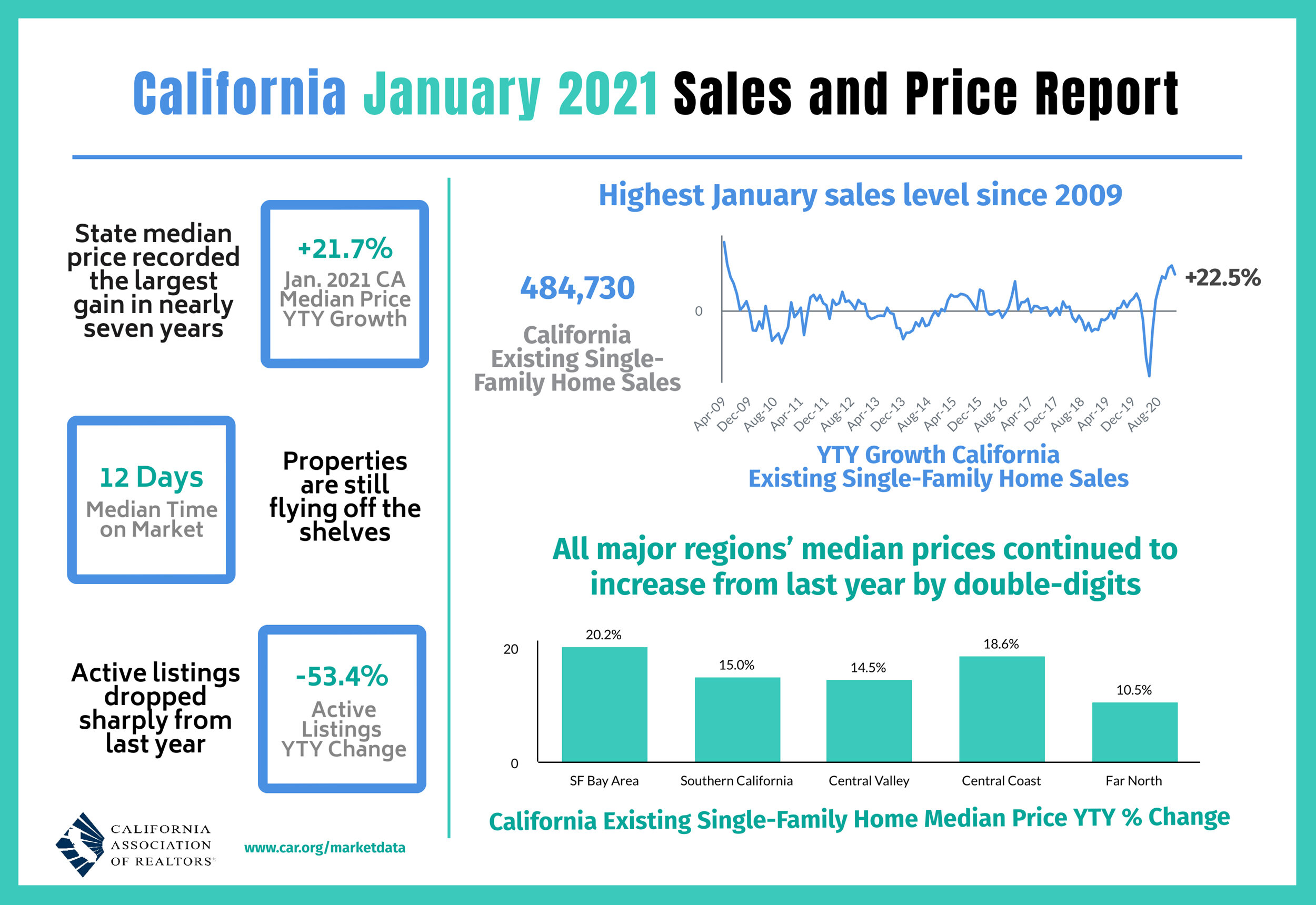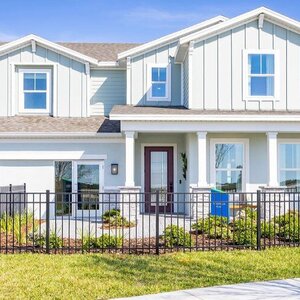Residential Real Estate News

California Home Sales Start 2021 with 22 Percent Spike Over Last Year
Residential News » Laguna Beach Edition | By Michael Gerrity | February 23, 2021 9:42 AM ET
The California Association of Realtors reported this week that the State's housing market kicked off the year on a positive note, following up on December's strong showing with double-digit price and sales growth on a yearly basis in January 2021.
Closed escrow sales of existing, single-family detached homes in California totaled a seasonally adjusted annualized rate of 484,730 in January 2021, according to information collected by C.A.R. The statewide annualized sales figure represents what would be the total number of homes sold during 2021 if sales maintained the January pace throughout the year. It is adjusted to account for seasonal factors that typically influence home sales.
January 2021 home sales decreased 4.9 percent from 509,750 in December and were up 22.5 percent from a year ago, when 395,700 homes were sold on an annualized basis. The year-over-year, double-digit sales gain was the sixth consecutive and the third straight month that sales increased more than 20 percent from a year ago.
"Despite an economy that's slow to recover, the momentum from late last year continued into January, driven by strong growth in California's core housing markets, especially in the San Francisco Bay Area, where the higher cost areas experienced the most sales growth," said C.A.R. President Dave Walsh, vice president and manager of the Compass San Jose office. "Home prices continued to power through the traditional slow season in January with the largest annual price gain in nearly seven years."
After hitting a record high price the previous month, California's median home price dipped below the $700,000 benchmark in January. The statewide median home price declined 2.5 percent on a month-to-month basis to $699,890 in January, down from December's $717,930. Low rates and tight supply continued to push up home prices on a year-over-year basis, gaining 21.7 percent from the $575,160 recorded last January. The double-digit increase from last year was the sixth in a row and the largest since February 2014.
"With the COVID-19 vaccine continuing to roll out, another fiscal stimulus relief package likely on the way and historically low interest rates, the housing market will continue to thrive," said C.A.R. Vice President and Chief Economist Jordan Levine. "The market outlook is stronger than previously projected as buyer demand continues to outstrip supply, but we do expect the current robust market growth to decelerate later this year as the housing shortage intensifies."
Other key points from C.A.R.'s January 2021 resale housing report include:
- At the regional level, sales continued to record healthy year-over-year gains in all major regions, except in the Far North, which was the only region that posted an annual sales decline. The San Francisco Bay Area had the highest year-over-year growth rate at a gain of 31.8 percent over last January. The Central Coast (19.9 percent) and Southern California (13.5 percent) regions also remained strong and experienced double-digit, year-over-year sales increases. Sales in the Central Valley region moderated slightly (6.9 percent) but continued to grow on a year-over-year basis. The Far North had a slow start for the year with a modest sales decline of 5.3 percent.
- Resort communities sustained their momentum going into 2021, as sales continue to outpace the rest of the state. Big Bear and Mammoth Lakes experienced year-over-year, triple-digit gain of 176.2 percent and 150 percent, respectively, while South Lake Tahoe and Mammoth Lake both had a sales growth rate of more than 30 percent.
- More than 80 percent of all counties - 42 of 51 - tracked by C.A.R. recorded a year-over-year increase in closed sales, with both Calaveras and Mariposa gaining the most from last year at 69.2 percent, followed by Alameda (53.6 percent), and San Benito (50 percent). Counties with an increase from last year averaged a gain of 22.7 percent in January, compared to 36.1 percent in December. Nine counties experienced a sales decline at the beginning of 2021, with Yuba dropping the most from last year at 25.4 percent, followed by Glenn (-25 percent) and Merced (-22 percent).
- All major regions' median prices continued to increase by double digits on a yearly basis, with the San Francisco Bay Area growing the fastest at 20.2 percent. The Central Coast region had another strong month, increasing 18.6 percent from January 2020, followed by Southern California (15.0 percent), the Central Valley (14.5 percent), and the Far North (10.5 percent). Three of four Central Coast region counties continued to surge by more than 25 percent from a year ago.
- Forty-seven of the 51 counties tracked by C.A.R. reported a gain in price on a year-over-year basis, with 40 of them increasing more than 10 percent. Del Norte had the largest price growth of 75.8 percent in January, followed by Mariposa (50.4 percent) and Nevada (48.4 percent). Glenn was one of four counties with an annual drop in price, dipping 21.4 percent from a year ago. Madera, Plumas and Tehama also experienced price declines in the first month of 2021, but their losses were all less than five percent.
- Homeowners reluctant to list their homes for sale during the pandemic is contributing to a shortage of active listings. As a result, C.A.R.'s Unsold Inventory Index (UII) remains extremely low at 1.5 months in January and was down sharply from 3.4 months in January 2020. The index indicates the number of months it would take to sell the supply of homes on the market at the current rate of sales.
- Active listings fell 53.4 percent from last year and continued to drop more than 40 percent on a year-over-year basis for the eighth straight month. On a month-to-month basis, for-sale properties dropped 10.7 percent in January.
- Except for the Bay Area, housing inventory continued to tighten up across the state in all major regions, declining more than 45 percent in January. Southern California had the biggest year-over-year supply drop of 56 percent in January, followed by the Central Coast (52.1 percent), the Central Valley (-48.6 percent), the Far North (-46.5 percent), and the San Francisco Bay Area (-30.9 percent).
- All 51 counties reported by C.A.R. experienced a year-over-year decline in active listings in January. Merced had the biggest drop from last year, with a decline of 72.8 percent, followed by Madera (-71.9 percent) and San Bernardino (-70.8 percent). Thirty-two counties had less than half the active listings they had in January 2020. San Mateo (-0.3 percent) and San Francisco (-5.6 percent) were the only counties in California with less than a 10 percent decline in active listings from the prior year.
- The 30-year, fixed-mortgage interest rate averaged 2.74 percent in January, down from 3.62 percent in January 2020, according to Freddie Mac. The five-year, adjustable mortgage interest rate was an average of 2.87 percent, compared to 3.33 percent in January 2020.
Sign Up Free | The WPJ Weekly Newsletter
Relevant real estate news.
Actionable market intelligence.
Right to your inbox every week.
Real Estate Listings Showcase
Related News Stories
Residential Real Estate Headlines
- Las Vegas Area Home Prices Uptick 4.3 Percent Annually in March
- Single-Family Rent Growth in U.S. Trends Upward in 2025
- U.S. Mortgage Rates Tick Down Post Trump Tariffs Commencement
- President Trump's 'Liberation Day' Tariffs Potential Impact on the U.S. Housing and Mortgage Markets
- Baby Boomers Biggest Cohort of U.S. Home Buyers in 2025 as Millennials Decline
- U.S. Monthly Housing Payments Hit Record High in 2025
- U.S. Pending Home Sales Uptick in February
- Global Prime Residential Rent Slowdown Continued in Late 2024
- Ireland Home Price Inflation Hits 8 Year High in Early 2025
- Existing Home Sales in America Uptick in February
- Great Miami Area Residential Sales Decline 15 Percent Annually in February
- Mortgage Rates Uptick in Mid-March, Ending 9-Week Decline in U.S.
- World Property Ventures Builds the Future of Real Estate with New Funding Round
- U.S. Builder Sentiment Declines Amid Economic Uncertainty and Rising Costs
- Black Homeownership Rates in U.S. Enjoy Largest Annual Increase of All Racial Groups
- Wealthy Renters Are Taking Over More of the U.S. Rental Market
- If U.S. Congress Does Not Extend NFIP Soon, Thousands of Daily Home Closings Impacted
- U.S. Mortgage Applications Spike 11 Percent in Early March
- Greater Palm Beach Area Residential Sales Rise in Early 2025
- New Apartments in U.S. Are Leasing at Slowest Pace on Record
- U.S. Mortgage Rates Drop to 4 Month Low in March
- Overall U.S. Mortgage Delinquency Rates Dip in December
- New Tariffs on Canada, Mexico to Impact U.S. Homebuilder Input Costs
- Monaco's Property Market: A Tale of Two Cities
- U.S. Home Purchase Cancellations Surge, 1 in 7 Sales Getting Canceled
- U.S. Pending Home Sales Hit Historic Low in Early 2025
- Greater Miami Area Residential Sales Dip in January
- Governor DeSantis Supports Ending Property Taxes in Florida
- WPV Aims to Become the Berkshire Hathaway of Real Estate Tech
- U.S. Home Sales Slump Continues in January
- Average Americans Spend 38 Percent of Monthly Income on Mortgage Payments
- Switzerland's Safe-Haven Appeal Grows with World's Wealthy Homebuyers
- U.S. Builder Confidence Rapidly Declines in February
- Las Vegas Home Sales Rise 6.7 Percent Annually in January, Condo Sales Dip
- Homebuyer Demand in America Drops to 5-Year Low in Early 2025
- Ownership More Affordable Than Renting in Most U.S. Markets
- The World's First Global Listings Service Launches, Called a GLS
- Home Prices Continue to Rise in 89 Percent of U.S. Metros in Late 2024
- Global Luxury Residential Prices Showed Gradual Improvement in Late 2024
- U.S. Construction Hiring Rate Drops to Lowest Levels in 5 Years






